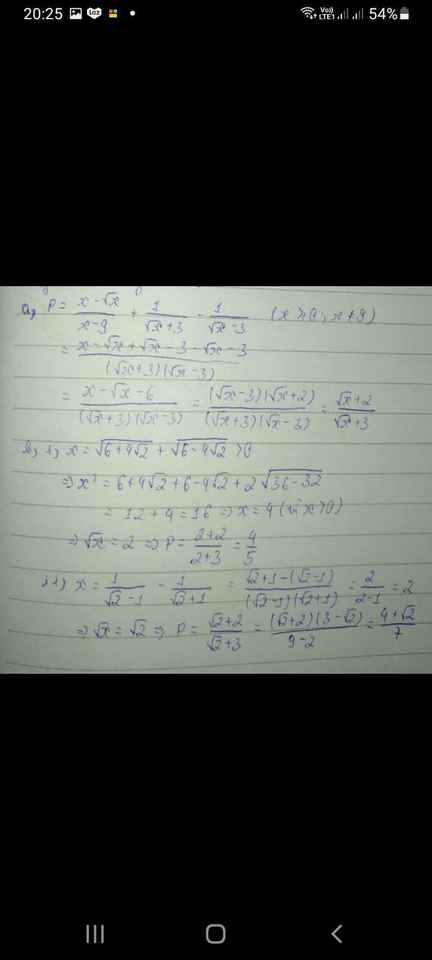cho H = \(\dfrac{x^2}{x^4+x^2+1}\). Tính H biết \(\dfrac{x}{x^2+x+1}\) = \(\dfrac{2}{3}\)

Những câu hỏi liên quan
Tìm x biết:a,dfrac{4}{5}+xdfrac{2}{3}b,dfrac{-5}{6}-xdfrac{2}{3}c,dfrac{1}{2}x+dfrac{3}{4}dfrac{-3}{10}d,dfrac{x}{3}-dfrac{1}{2}dfrac{1}{5}e,dfrac{x+3}{15}dfrac{1}{3}h,x+30%x-1,3k,3dfrac{1}{3}x+16dfrac{1}{4}13,25m,dfrac{x-6}{2}dfrac{50}{x-6}n,x-13,424,5-6,7.5,2p,15,7x+3,6x-96,5q,2,5x-11,6-59,1
Đọc tiếp
Tìm x biết:
\(a,\dfrac{4}{5}+x=\dfrac{2}{3}\)
\(b,\dfrac{-5}{6}-x=\dfrac{2}{3}\)
\(c,\dfrac{1}{2}x+\dfrac{3}{4}=\dfrac{-3}{10}\)
\(d,\dfrac{x}{3}-\dfrac{1}{2}=\dfrac{1}{5}\)
\(e,\dfrac{x+3}{15}=\dfrac{1}{3}\)
\(h,x+30\%x=-1,3\)
\(k,3\dfrac{1}{3}x+16\dfrac{1}{4}=13,25\)
\(m,\dfrac{x-6}{2}=\dfrac{50}{x-6}\)
\(n,x-13,4=24,5-6,7.5,2\)
\(p,15,7x+3,6x=-96,5\)
\(q,2,5x-11,6=-59,1\)
a)4/5+x=2/3
x=2/3-4/5
x=-2/15
b)-5/6-x=2/3
x=-5/6-2/3
x=-3/2
c)1/2x+3/4=-3/10
1/2x=-3/10-3/4
1/2x=-21/20
x=-21/20:1/2
x=-21/10
d)x/3-1/2=1/5
x/3=1/5+1/2
x/3=7/10
10x/30=21/30
10x=21
x=21:10
x=21/10
Đúng 1
Bình luận (0)
bài 4 giải các phương trình saub,dfrac{x+2}{3}-dfrac{3}{4}dfrac{x-1}{3}d,dfrac{x-2}{4}+dfrac{x+1}{6}dfrac{2x}{3}f,dfrac{x+2}{4}+dfrac{2x-3}{3}dfrac{x-12}{6}h,dfrac{10x+3}{12}1+dfrac{6+8x}{9}j,dfrac{2x-1}{5}-dfrac{x-2}{3}dfrac{x+7}{15}m,dfrac{2+x}{5}-0,5xdfrac{1-2x}{4}+0,25
Đọc tiếp
bài 4 giải các phương trình sau
b,\(\dfrac{x+2}{3}-\dfrac{3}{4}=\dfrac{x-1}{3}\)
d,\(\dfrac{x-2}{4}+\dfrac{x+1}{6}=\dfrac{2x}{3}\)
f,\(\dfrac{x+2}{4}+\dfrac{2x-3}{3}=\dfrac{x-12}{6}\)
h,\(\dfrac{10x+3}{12}=1+\dfrac{6+8x}{9}\)
j,\(\dfrac{2x-1}{5}-\dfrac{x-2}{3}=\dfrac{x+7}{15}\)
m,\(\dfrac{2+x}{5}-0,5x=\dfrac{1-2x}{4}+0,25\)
k,\(\dfrac{x}{3}-\dfrac{2x+1}{2}=\dfrac{x}{6}-x\)
giúp mk câu k nhé đề bài như trên
Đúng 0
Bình luận (0)
b: \(\Leftrightarrow4x+8-9=4x-4\)
=>-1=-4(loại)
d: \(\Leftrightarrow3\left(x-2\right)+2\left(x+1\right)=8x\)
=>8x=3x-6+2x+2=5x-4
=>3x=-4
=>x=-4/3
f: \(\Leftrightarrow3\left(x+2\right)+4\left(2x-3\right)=2\left(x-12\right)\)
=>3x+6+8x-12=2x-24
=>11x-6=2x-24
=>9x=-18
=>x=-2
Đúng 1
Bình luận (0)
Tìm x, biết:
\(a,\dfrac{1}{3}:\left(2x-1\right)=\dfrac{-1}{6}\)
\(b,\left(3x+2\right)\left(\dfrac{-2}{5}x-7\right)=0\)
\(c,\dfrac{x}{8}=\dfrac{9}{4}\)
\(d,\dfrac{x-3}{2}=\dfrac{18}{x-3}\)
\(e,4,5x-6,2x=6,12\)
\(h,11,4-\left(x-3,4\right)=-16,2\)
a: =>2x-1=-2
=>2x=-1
hay x=-1/2
b: \(\Leftrightarrow\left[{}\begin{matrix}3x+2=0\\-\dfrac{2}{5}x-7=0\end{matrix}\right.\Leftrightarrow x\in\left\{-\dfrac{2}{3};-\dfrac{35}{2}\right\}\)
c: x/8=9/4
nên x/8=18/8
hay x=18
d: \(\Leftrightarrow\left(x-3\right)^2=36\)
=>x-3=6 hoặc x-3=-6
=>x=9 hoặc x=-3
e: =>-1,7x=6,12
hay x=-3,6
h: =>x-3,4=27,6
hay x=31
Đúng 1
Bình luận (0)
a) \(\dfrac{1}{3}\div\left(2x-1\right)=\dfrac{-1}{6}\)
\(\left(2x-1\right).\dfrac{1}{3}\div\left(2x-1\right)=\left(2x-1\right)\left(-\dfrac{1}{6}\right)\)
\(\dfrac{1}{3}=\left(2x-1\right)\left(-\dfrac{1}{6}\right)\)
\(\dfrac{1}{3}=-1\left(2x-1\right)\div6\)
\(\dfrac{1}{3}=-2x+1\div6\)
\(x=-\dfrac{1}{2}\)
b) \(\left(3x+2\right)\left(\dfrac{-2}{5}x-7\right)=0\)
\(TH1:3x+2=0\)
\(3x=0-2\)
\(3x=-2\)
\(x=\dfrac{-2}{3}\)
\(TH2:\left(-\dfrac{2}{5}x-7\right)=0\)
\(\left(\dfrac{-2}{5}x-7\right)=0\)
\(\left(\dfrac{-2x}{5}+\dfrac{5\left(-7\right)}{5}\right)=0\)
\(\left(\dfrac{-2x-35}{5}\right)=0\)
\(-2x-35=0\)
\(-2x=0+35\)
\(x=-\dfrac{35}{2}\)
c) \(\dfrac{x}{8}=\dfrac{9}{4}\)
\(\Leftrightarrow x=\dfrac{9.8}{4}=\dfrac{72}{4}=18\)
\(x=18\)
d) \(\dfrac{x-3}{2}=\dfrac{18}{x-3}\)
\(x-3=18+2\)
\(x=20-3\)
\(x=17\)
e) \(4,5x-6,2x=6,12\)
\(\dfrac{9x}{2}-6,2.x=6,12\)
\(\dfrac{9x}{2}+\dfrac{-31x}{5}=6,12\)
\(\dfrac{5.9x}{10}+\dfrac{2\left(-31\right)x}{10}=6.12\)
\(\dfrac{45x-62x}{10}=6.12\)
\(=-17x\div10=6.12\)
\(-17x=10.6.12\)
\(x=-3,6\)
h) \(11,4-\left(x-3,4\right)=-16,2\)
\(x-3,4=-16,2+11,4\)
\(x-3,4=-4,8\)
\(x=-1,4\)
Đúng 2
Bình luận (0)
Tìm x a,3-xx+1,8b,2x-57x+35c,2left(x+10right)3left(x-6right)d,8left(x-dfrac{3}{8}right)+16left(dfrac{1}{6}+xright)+xe,dfrac{2}{9}-3xdfrac{4}{3}-xg,dfrac{1}{2}x+dfrac{5}{6}dfrac{3}{4}x-dfrac{1}{2}h,x-4dfrac{5}{6}left(6-dfrac{6}{5}xright)k,7x^2-116x^2-2m,5left(x+3.2^3right)10^2n,dfrac{4}{9}-(dfrac{1}{6^2})dfrac{2}{3}left(x-dfrac{2}{3}right)^2+dfrac{5}{12}
Đọc tiếp
Tìm x
\(a,3-x=x+1,8\)
\(b,2x-5=7x+35\)
\(c,2\left(x+10\right)=3\left(x-6\right)\)
\(d,8\left(x-\dfrac{3}{8}\right)+1=6\left(\dfrac{1}{6}+x\right)+x\)
\(e,\dfrac{2}{9}-3x=\dfrac{4}{3}-x\)
\(g,\dfrac{1}{2}x+\dfrac{5}{6}=\dfrac{3}{4}x-\dfrac{1}{2}\)
\(h,x-4=\dfrac{5}{6}\left(6-\dfrac{6}{5}x\right)\)
\(k,7x^2-11=6x^2-2\)
\(m,5\left(x+3.2^3\right)=10^2\)
\(n,\dfrac{4}{9}-(\dfrac{1}{6^2})=\dfrac{2}{3}\left(x-\dfrac{2}{3}\right)^2+\dfrac{5}{12}\)
\(a,3-x=x+1,8\)
\(\Rightarrow-x-x=1,8-3\)
\(\Rightarrow-2x=-1,2\)
\(\Rightarrow x=0,6\)
\(b,2x-5=7x+35\)
\(\Rightarrow2x-7x=35+5\)
\(\Rightarrow-5x=40\)
\(\Rightarrow x=-8\)
\(c,2\left(x+10\right)=3\left(x-6\right)\)
\(\Rightarrow2x+20=3x-18\)
\(\Rightarrow2x-3x=-18-20\)
\(\Rightarrow-x=-38\)
\(\Rightarrow x=38\)
\(d,8\left(x-\dfrac{3}{8}\right)+1=6\left(\dfrac{1}{6}+x\right)+x\)
\(\Rightarrow8x-3+1=1+6x+x\)
\(\Rightarrow8x-3=7x\)
\(\Rightarrow8x-7x=3\)
\(\Rightarrow x=3\)
\(e,\dfrac{2}{9}-3x=\dfrac{4}{3}-x\)
\(\Rightarrow-3x+x=\dfrac{4}{3}-\dfrac{2}{9}\)
\(\Rightarrow-2x=\dfrac{10}{9}\)
\(\Rightarrow x=-\dfrac{5}{9}\)
Đúng 4
Bình luận (0)
\(g,\dfrac{1}{2}x+\dfrac{5}{6}=\dfrac{3}{4}x-\dfrac{1}{2}\)
\(\Rightarrow\dfrac{1}{2}x-\dfrac{3}{4}x=-\dfrac{1}{2}-\dfrac{5}{6}\)
\(\Rightarrow-\dfrac{1}{4}x=-\dfrac{4}{3}\)
\(\Rightarrow x=\dfrac{16}{3}\)
\(h,x-4=\dfrac{5}{6}\left(6-\dfrac{6}{5}x\right)\)
\(\Rightarrow x-4=5-x\)
\(\Rightarrow x+x=5+4\)
\(\Rightarrow2x=9\)
\(\Rightarrow x=\dfrac{9}{2}\)
\(k,7x^2-11=6x^2-2\)
\(\Rightarrow7x^2-6x^2=-2+11\)
\(\Rightarrow x^2=9\Rightarrow\left[{}\begin{matrix}x=3\\x=-3\end{matrix}\right.\)
\(m,5\left(x+3\cdot2^3\right)=10^2\)
\(\Rightarrow5\left(x+24\right)=100\)
\(\Rightarrow x+24=20\)
\(\Rightarrow x=-4\)
\(n,\dfrac{4}{9}-\left(\dfrac{1}{6^2}\right)=\dfrac{2}{3}\left(x-\dfrac{2}{3}\right)^2+\dfrac{5}{12}\)
\(\Rightarrow\dfrac{2}{3}\left(x-\dfrac{2}{3}\right)^2+\dfrac{5}{12}=\dfrac{4}{9}-\dfrac{1}{36}\)
\(\Rightarrow\dfrac{2}{3}\left(x-\dfrac{2}{3}\right)^2+\dfrac{5}{12}=\dfrac{5}{12}\)
\(\Rightarrow\dfrac{2}{3}\left(x-\dfrac{2}{3}\right)^2=0\)
\(\Rightarrow x-\dfrac{2}{3}=0\Rightarrow x=\dfrac{2}{3}\)
#\(Urushi\text{☕}\)
Đúng 4
Bình luận (0)
a: 3-x=x+1,8
=>-2x=-1,2
=>x=0,6
b: 2x-5=7x+35
=>-5x=40
=>x=-8
c: 2(x+10)=3(x-6)
=>3x-18=2x+20
=>x=38
d; 8(x-3/8)+1=6(1/6+x)+x
=>8x-3+1=1+6x+x
=>8x-2=7x+1
=>x=3
e: =>-3x+x=4/3-2/9
=>-2x=12/9-2/9=10/9
=>x=-5/9
g: =>3/4x-1/2x=5/6+1/2
=>1/4x=5/6+3/6=8/6=4/3
=>x=4/3*4=16/3
h: =>x-4=-x+5
=>2x=9
=>x=9/2
Đúng 2
Bình luận (0)
Cho biết \(\dfrac{x}{x^2-x+1}=\dfrac{2}{3}\). Hãy tính giá trị của biểu thức: \(Q=\dfrac{x^2}{x^4+x^2+1}\)
Ta có :
\(\dfrac{x}{x^2-x+1}=\dfrac{2}{3}\)
\(\Leftrightarrow\dfrac{x^2-x+1}{x}=\dfrac{3}{2}\)
\(\Leftrightarrow\dfrac{x^2}{x}-\dfrac{x}{x}+\dfrac{1}{x}=\dfrac{3}{2}\)
\(\Leftrightarrow\dfrac{x^2}{x}+\dfrac{x}{x}+\dfrac{1}{x}=\dfrac{3}{2}+2\)
\(\Leftrightarrow\dfrac{x^2+x+1}{x}=\dfrac{7}{2}\)
\(\Leftrightarrow\dfrac{x}{x^2+x+1}=\dfrac{2}{7}\)
Lại có :
\(Q=\dfrac{x^2}{x^4+x^2+1}\)
\(=\dfrac{x^2}{x^4+x^3-x^3+x^2+x-x+1}\)
\(=\dfrac{x^2}{x^2\left(x^2+x+1\right)-x\left(x^2+x+1\right)+\left(x^2+x+1\right)}\)
\(=\dfrac{x^2}{\left(x^2+x+1\right)\left(x^2-x+1\right)}\)
\(=\dfrac{x}{x^2+x+1}.\dfrac{x}{x^2-x+1}\)
\(=\dfrac{2}{3}.\dfrac{2}{7}\)
\(=\dfrac{4}{21}\)
Vậy...
Đúng 0
Bình luận (0)
\(\dfrac{x}{x^2-x+1}=\dfrac{2}{3}\Leftrightarrow\dfrac{x^2-x+1}{x}=\dfrac{3}{2}\)
\(\Leftrightarrow x-1+\dfrac{1}{x}=\dfrac{3}{2}\)
\(\Leftrightarrow x+\dfrac{1}{x}=\dfrac{5}{2}\)
\(\Leftrightarrow x^2+\dfrac{1}{x^2}+2=\dfrac{25}{4}\Leftrightarrow x^2+\dfrac{1}{x^2}=\dfrac{17}{4}\)
\(\Leftrightarrow x^2+\dfrac{1}{x^2}+1=\dfrac{21}{4}\)
\(\dfrac{1}{Q}=\dfrac{x^4+x^2+1}{x^2}=x^2+1+\dfrac{1}{x^2}=\dfrac{17}{4}\Leftrightarrow Q=\dfrac{4}{17}\)
Đúng 0
Bình luận (3)
Tính các giới hạn sau:
1. \(\lim\limits_{x\rightarrow a}\dfrac{x^2-\left(a+1\right)x+a}{x^3-a^3}\)
2. \(\lim\limits_{x\rightarrow1}\left(\dfrac{1}{1-x}-\dfrac{3}{1-x^3}\right)\)
3. \(\lim\limits_{h\rightarrow0}\dfrac{\left(x+h\right)^3-x^3}{h}\)
1: \(A=\dfrac{x^2-\left(a+1\right)x+a}{x^3-a^3}\)
\(=\dfrac{x^2-xa-x+a}{\left(x-a\right)\left(x^2+ax+a^2\right)}\)
\(=\dfrac{\left(x-a\right)\left(x-1\right)}{\left(x-a\right)\left(x^2+ax+a^2\right)}=\dfrac{x-1}{x^2+ax+a^2}\)
\(lim_{x->a}A=lim_{x->a}\left(\dfrac{x-1}{x^2+ax+a^2}\right)\)
\(=\dfrac{a-1}{a^2+a^2+a^2}=\dfrac{a-1}{3a^2}\)
2: \(B=\dfrac{1}{1-x}-\dfrac{3}{1-x^3}\)
\(=\dfrac{-1}{x-1}+\dfrac{3}{x^3-1}\)
\(=\dfrac{-x^2-x-1+3}{\left(x-1\right)\left(x^2+x+1\right)}=\dfrac{-x^2-x+2}{\left(x-1\right)\left(x^2+x+1\right)}\)
\(=\dfrac{-\left(x+2\right)\left(x-1\right)}{\left(x-1\right)\left(x^2+x+1\right)}=\dfrac{-x-2}{x^2+x+1}\)
\(lim_{x->1}\left(B\right)=\dfrac{-1-2}{1^2+1+1}=\dfrac{-3}{3}=-1\)
3: \(C=\dfrac{\left(x+h\right)^3-x^3}{h}=\dfrac{\left(x+h-x\right)\left(x^2+2xh+h^2+x^2+hx+x^2\right)}{h}\)
\(=3x^2+3hx\)
\(lim_{h->0}\left(C\right)=3x^2+3\cdot0\cdot x=3x^2\)
Đúng 0
Bình luận (0)
Giải các phương trình sau:
\(e.\dfrac{12}{1-9x^2}=\dfrac{1-3x}{1+3x}-\dfrac{1+3x}{1-3x}\)
\(f.\dfrac{6x+1}{x^2-7x+10}+\dfrac{5}{x-2}=\dfrac{3}{x-5}\)
\(g.\dfrac{2}{x+2}-\dfrac{2x^2+16}{x^3+8}=\dfrac{5}{x^2-2x+4}\)
\(h.\dfrac{8}{x-8}+\dfrac{11}{x-11}=\dfrac{9}{x-9}+\dfrac{10}{x-10}\)
e) ĐK : \(\left\{{}\begin{matrix}1+3x\ne0\\1-3x\ne0\end{matrix}\right.\Leftrightarrow\left\{{}\begin{matrix}3x\ne-1\\3x\ne1\end{matrix}\right.\Leftrightarrow\left\{{}\begin{matrix}x\ne\dfrac{-1}{3}\\x\ne\dfrac{1}{3}\end{matrix}\right.\)
\(\Leftrightarrow\dfrac{12}{\left(1-3x\right)\left(1+3x\right)}=\dfrac{\left(1-3x\right)^2-\left(1+3x\right)^2}{\left(1+3x\right)\left(1-3x\right)}\)
\(\Leftrightarrow12\left(1+3x\right)\left(1-3x\right)=\left(1-3x\right)\left(1+3x\right)\left(1-3x-1-3x\right)\left(1-3x+1+3x\right)\)
\(\Leftrightarrow12=\left(-6x\right).2\Leftrightarrow6=-6x\)
\(\Leftrightarrow x=-1\left(TM\right)\)
Đúng 1
Bình luận (0)
Thu gọn P
\(P=\dfrac{x-\sqrt{x}}{x-9}+\dfrac{1}{\sqrt{x}+3}-\dfrac{1}{\sqrt{x}-3}\)
a) Tính P biết \(x=\sqrt{6+4\sqrt{2}}+\sqrt{6-4\sqrt{2}}\)
b) Tính P biết \(x=\dfrac{1}{\sqrt{2}-1}-\dfrac{1}{\sqrt{2}+1}\)
Cho các biểu thức
A = \(\dfrac{1}{x+2}-\dfrac{2x}{4-x^2}+\dfrac{3}{x-2}\) và B = \(\dfrac{x+2}{3x+2}\)với x ≠ 2; x ≠ -2; x ≠ -\(\dfrac{2}{3}\)
a. Tính giá trị của A biết \(3x^2+8x+4=0\)
b. Rút gọn B
\(a,\Leftrightarrow\left[{}\begin{matrix}3x+2=0\\x+2=0\end{matrix}\right.\Leftrightarrow\left[{}\begin{matrix}x=-\dfrac{2}{3}\left(l\right)\\x=-2\left(l\right)\end{matrix}\right.\Leftrightarrow x\in\varnothing\Leftrightarrow A\in\varnothing\\ b,\text{ý bạn là rút gọn A hả?}\\ A=\dfrac{x-2+2x+3x+6}{\left(x-2\right)\left(x+2\right)}=\dfrac{6x+4}{\left(x-2\right)\left(x+2\right)}\)
Đúng 4
Bình luận (1)
























